
Who we are?
Since its establishment in 1979, Hashmanis hospital has been able to achieve one milestone after the other with the most advanced technology. Hashmanis hospital has successfully developed itself among the most reputed names in the field of healthcare
More than 100 bedded tertiary care hospital with seven branches across Karachi, left no stone unturned in combating health problems faced by many people in Pakistan.



Symptom of COVID - 19

Body Temperature

Prolonged Cough


Other Symptoms are

How To Protect Yourself
Imagine living in a world where you don't feel safe, and every day is a challenge to survive. There are regions where people do live like this, unfortunately. We highly recommend you follow these rules.
Take Precautions
Avoid Closed Contacts (Social Distancing)
Avoid Touching Eyes, Nose and Mouth
Coronavirus is likely to enter your body through eyes, nose or mouth
Avoid high touch surfaces
Disinfect the Household
Frequently Asked Questions
- Fever or chills
- Cough
- Difficulty breathing
- Fatigue
- Body aches
- Headache
- Loss of taste or smell
- Sore throat
- Congestion
- Runny nose
- Nausea
- Diarrhea
Yes. It is possible to test positive for flu and as well as other respiratory infections and COVID-19 at the same time.
- Viral tests (PCR) – this is the confirmatory test for COVID-19
- Antibody tests (IgG/IgM) – this test checks for current or previous infection
Yes, it is possible. You may test negative if the sample is collected prior to getting infected with COVID-19. You’re likely to catch the virus even after the test. You must protect yourself and others even if tested negative.
Yes. The test only measures infection, not exposure. So, quarantine yourself for at least for 14 days regardless of test results.
- Viral tests identify if you currently have an infection with the virus that causes COVID-19
- Viral or PCR test identify the virus in respiratory samples, using swabs to take the specimen from nose and mouth.
- Molecular tests identifies the active infection. This test works best between 2 days before and 7 days after you have symptoms.
- Serum antibody tests measure the body’s response to infection. This test works best at least 14 days following your first symptoms.
- Antibody tests look for antibodies in a body that start to develop when someone catches the virus
- Antibodies take one to three weeks to develop
- Some people might take longer while others may not develop antibodies at all.
- A positive result from this test may mean that the person was previously infected with the virus.
- People aged 65 years and older
- People who live in a nursing home or long-term care facility
- People with chronic lung disease (moderate to severe asthma)
- People who have serious heart conditions
- People who have weak immune system because of:
- cancer treatment
- smoking
- bone marrow or organ transplantation
- immune deficiencies
- poorly controlled HIV or AIDS,
- prolonged use of corticosteroids and other medications
- People with severe obesity (body mass index [BMI] ≥40)
- People with diabetes
- People with chronic kidney disease undergoing dialysis
- People with liver diseases
- Stock up on supplies
- Take everyday precautions to maintain sufficient distance between one another
- When in public, avoid close contact with people who are sick
- Wash your hands often
- Avoid crowds, cruise, and non-essential errands
Well-controlled means that your condition is stable, not life-threatening. This stable condition should match laboratory assessments and other findings.
Severe illness means, the impact of the illness or condition on your body. You should talk to your healthcare provider if you have a question about your health.
People with disabilities are three times more likely to have heart disease, stroke, diabetes, or cancer than people without disabilities.
However, most people with disabilities are not inherently at risk for getting infected with COVID-19. Some with physical disabilities might be vulnerable to get COVID-19 because of their underlying preexisting medical conditions.
- inflammation
- cell damage throughout the body
- weakens the immune system
- continue your medications for hypertension as directed
- keep a log of your blood pressure every day
- Stay in touch with your healthcare provider to make sure your blood pressure is well controlled.
Yes. Continue to take your blood pressure medications exactly as prescribed. Continue all your regular medications as prescribed by your doctor.
- Avoid close contact with people who are sick.
- Stay home when sick, except to get medical care.
- Cover your coughs and sneezes with a tissue and throw the tissue in the trash.
- Wash your hands often with soap and water for at least 20 seconds (after blowing your nose, coughing, or sneezing; after going to the bathroom; before eating or preparing food.)
- Use an alcohol-based hand sanitizer with at least 60% alcohol if soap and water are not readily available.
- Always wash hands with soap and water if hands are visibly dirty.
- Clean and disinfect frequently touched surfaces and objects (e.g., tables, countertops, light switches, doorknobs, and cabinet handles).
- fever
- runny
- nose
- cough
- vomiting
- diarrhea
- Children older than 2 years should wear a cloth face mask according to the World Health Organization
- Cloth face coverings should NOT be put on babies or children younger than 2 years because of the suffocation hazard
- Children younger than 2 years of age are listed as an exception
For those who are critically sick (due to low oxygen levels or lung damage from pneumonia), hospitalization is required. Patients can receive oxygen and other treatments to help their breathing as well as supportive care and close monitoring.
Most people do not get low oxygen levels and can monitor the conditions. Over-the-counter medicines can be used to manage symptoms. Infected persons can often have telephone check-ins with health providers for close monitoring.
No. Thosewith mild symptoms, no underlying comorbids and breathing issues should stay in home isolation and get medical help using automated remote monitoring programs.
Contact Form
Some description text for this item








